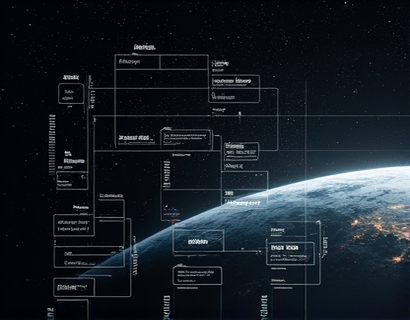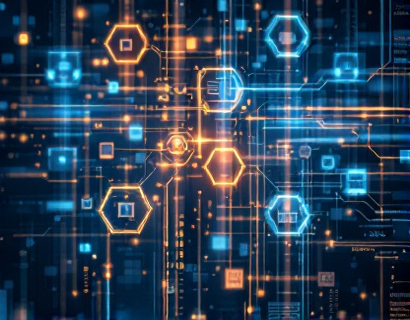Decentralized DAO Management and Analytics: Empowering Organizations for Transparent Growth
In the rapidly evolving landscape of decentralized technologies, Decentralized Autonomous Organizations (DAOs) have emerged as a transformative force, redefining governance and collaboration. However, managing a DAO effectively requires robust tools and strategies to ensure transparency, efficiency, and sustainable growth. This article delves into the critical role of decentralized DAO management and analytics, exploring how innovative software solutions can empower organizations to thrive in the decentralized ecosystem.
Understanding DAOs and the Need for Advanced Management
DAOs are organizations governed by smart contracts on blockchain networks, enabling decentralized decision-making and autonomous operations. Unlike traditional organizations, DAOs operate without a central authority, relying on community participation and transparent rules encoded in code. This structure offers numerous benefits, including increased transparency, reduced bureaucracy, and enhanced security. However, the decentralized nature of DAOs also presents unique challenges in governance and management.
The lack of a central authority means that DAOs must rely on decentralized tools and processes to coordinate activities, make decisions, and monitor performance. Traditional management practices are often inadequate in this context, necessitating the development of specialized software solutions. These tools are designed to streamline governance, enhance collaboration, and provide actionable insights, enabling DAOs to achieve their goals efficiently and transparently.
Key Components of Decentralized DAO Management
Effective DAO management encompasses several critical components, each addressing specific aspects of governance and operations. These components include token management, proposal and voting systems, membership and access control, and comprehensive analytics and reporting.
Token Management
Tokens play a vital role in DAOs, serving as the medium for participation, governance, and incentivization. Token management tools facilitate the creation, distribution, and management of tokens, ensuring that they are used effectively to align community interests with organizational goals. These tools handle tasks such as token minting, burning, and transfer, as well as managing token balances and permissions.
Advanced token management systems also support complex token economies, allowing for the creation of multiple token types with different functionalities and permissions. This flexibility is crucial for DAOs that need to implement diverse incentive structures and governance models.
Proposal and Voting Systems
Decentralized decision-making is a cornerstone of DAOs, and robust proposal and voting systems are essential for this process. These systems enable members to submit, discuss, and vote on proposals that shape the organization's direction. Key features include proposal creation and submission, public discussion forums, voting mechanisms, and transparent results reporting.
To ensure fairness and security, these systems employ cryptographic techniques to prevent fraud and manipulate votes. They also provide tools for moderating discussions, managing voting periods, and ensuring compliance with the DAO's governance rules. By streamlining the proposal and voting process, these tools enhance participation and accountability, fostering a more engaged and empowered community.
Membership and Access Control
Managing membership and access is crucial for maintaining the integrity and security of a DAO. Access control tools ensure that only authorized members can participate in governance activities, access sensitive information, and perform critical tasks. These tools support various levels of membership, each with specific permissions and responsibilities.
Membership management features include user registration and verification, role assignment, and permission management. By implementing strict access controls, DAOs can prevent unauthorized access and ensure that governance processes are conducted by trusted participants.
Analytics and Reporting
Data-driven decision-making is essential for the sustainable growth of DAOs. Analytics and reporting tools provide insights into various aspects of DAO operations, from token economics to community engagement and proposal outcomes. These tools collect and analyze data from different sources, generating comprehensive reports and dashboards that administrators can use to monitor performance and identify areas for improvement.
Key analytics features include real-time monitoring, historical data analysis, customizable reports, and predictive analytics. By leveraging these insights, administrators can make informed decisions, optimize processes, and align the organization's strategies with its long-term goals.
Enhancing Collaboration through Decentralized Tools
Collaboration is a fundamental aspect of DAO operations, and decentralized tools can significantly enhance this process. Communication platforms, project management tools, and collaborative workspaces are essential for fostering cooperation among community members, regardless of their geographical location.
Communication Platforms
Effective communication is vital for the smooth functioning of a DAO. Decentralized communication platforms enable members to discuss proposals, share ideas, and coordinate activities in a transparent and secure manner. These platforms often integrate with blockchain networks to ensure that all communications are immutable and verifiable.
Features such as threaded discussions, file sharing, and notification systems help maintain clarity and organization in conversations. By centralizing communication within a single platform, DAOs can reduce information silos and ensure that all members are informed and engaged.
Project Management Tools
Project management tools are crucial for organizing and tracking the progress of various initiatives within a DAO. These tools help teams plan, execute, and monitor projects, ensuring that they are completed on time and within scope. Decentralized project management platforms offer features such as task assignment, deadline setting, progress tracking, and resource allocation.
Integration with blockchain-based workflows ensures that all project data is transparent and tamper-proof. This transparency builds trust among team members and stakeholders, as everyone can verify the status and progress of ongoing projects. Additionally, these tools support cross-functional collaboration, enabling members from different backgrounds and expertise to work together seamlessly.
Collaborative Workspaces
Collaborative workspaces provide a centralized environment for members to create, share, and edit documents, code, and other assets. These spaces are essential for fostering innovation and ensuring that knowledge and resources are shared effectively within the DAO.
Decentralized workspaces often include features such as version control, real-time editing, and access control. By leveraging blockchain technology, these workspaces ensure that all documents are secure, auditable, and resistant to tampering. This level of security is particularly important for DAOs handling sensitive information or critical projects.
Actionable Insights through Advanced Analytics
One of the most significant advantages of integrating analytics tools into DAO management is the ability to generate actionable insights. These insights empower administrators to make data-driven decisions, optimize operations, and drive sustainable growth.
Token Economics Analysis
Understanding the token economics of a DAO is crucial for maintaining a healthy and balanced token distribution. Analytics tools can track token supply, circulation, and ownership, providing insights into the economic dynamics within the organization.
By analyzing token distribution patterns, administrators can identify potential issues such as centralization of tokens or inefficient incentive structures. These insights enable them to implement corrective measures, ensuring that tokens are used effectively to motivate and reward community contributions.
Community Engagement Metrics
Measuring community engagement is essential for assessing the health and vitality of a DAO. Analytics tools can track various engagement metrics, such as participation in discussions, proposal voting rates, and contribution to projects.
These metrics provide valuable feedback on member involvement and help administrators identify areas where engagement can be improved. By fostering higher engagement, DAOs can build a more active and committed community, driving collective success.
Governance Performance Indicators
Governance performance indicators (GPIs) offer a quantitative way to evaluate the effectiveness of DAO governance. Analytics tools can track GPIs such as proposal adoption rates, voting turnout, and decision-making speed.
By monitoring these indicators, administrators can assess the efficiency and responsiveness of the governance process. This data-driven approach allows for continuous improvement, ensuring that the DAO operates smoothly and aligns with its strategic objectives.
Building a Transparent and Sustainable DAO
By leveraging decentralized DAO management and analytics tools, organizations can create a transparent and sustainable governance model. Transparency is a core value of DAOs, and these tools enhance it by providing clear visibility into all aspects of operations.
Transparent governance builds trust among members and stakeholders, as everyone can see how decisions are made and resources are allocated. This trust is fundamental for the long-term success and adoption of DAOs in various industries.
Sustainability is another critical aspect, ensuring that the DAO can endure and thrive over time. Data-driven decision-making, optimized token economics, and efficient collaboration processes all contribute to a sustainable DAO. By focusing on these elements, administrators can create a resilient organization that adapts to changing conditions and continues to deliver value to its members.
Conclusion
Decentralized DAO management and analytics are transformative forces in the world of blockchain-based organizations. By adopting innovative software solutions, DAOs can overcome the challenges of decentralized governance and operations, unlocking their full potential for transparent growth and sustainable success. These tools not only streamline processes and enhance collaboration but also provide actionable insights that drive data-driven decision-making.
As the DAO ecosystem continues to evolve, the importance of robust management and analytics tools will only grow. Organizations that embrace these technologies will be better positioned to navigate the complexities of decentralized governance, foster a vibrant community, and achieve long-term success.










































